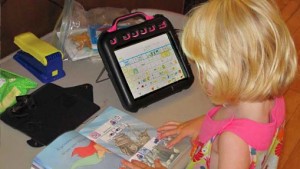Children with Fragile X Syndrome
Description
- This syndrome1 is caused when the X chromosome suffers a mutation or change in what has been identified as the FMR1 gene;
- It is also known as Martin-Bell Syndrome;
- This mutation may often cause mild to moderate cognitive delays, depending if it is a permutation (a mild change) or a full mutation (a major change) of the FMR1 gene;
- Results from chromosomal analyses (see full Glossary) often find a partially broken (‘fragile’) site on some X chromosomes;
- 1 in 4,000 males and 1 in 8,000 females may be diagnosed with Fragile X syndrome [1]
Children with Fragile X may have some or all of the following characteristics:
Physical:
- Long narrow face with prominent forehead, nose, jaw or ears;
- Macroorchildism (abnormally large testes);
- Heart murmurs;
- Strabismus, a disorder where both eyes do not line up in the same direction
Developmental [1]
- Learning disabilities;
- Cognitive delays or intellectual disability (See more here)
- Anxiety disorder;
- Autistic like behaviors;
- Attention deficit/hyperactivity disorder;
- Fragile X is the most common known cause of autism (ASD) and is the most common known inherited cause of cognitive delays.
Intervention Options
- Infant and child development support through IDP/AIDP and/or SCD/ASCD – Infants with Fragile X syndrome in British Columbia, Canada will be first referred to the Infant Development Program, IDP, or Aboriginal Infant Development Program, AIDP. Children ages 3 and older will be referred to the Supported Child Development Program, SCDP, and Aboriginal Supported Child Development Program ASCD. Consultants will provide support to parents and teachers with issues related to overall development. These agencies may also help parents and teachers get other services including health and counseling, among others.
- Occupational therapy: Children with FXS may experience difficulties with motor coordination in daily activities, including feeding and dressing themselves.
- Sensory Integration Therapy: Children with FXS may experience sensory processing difficulties.
- Speech Language Therapist (SLP): Children with FXS may experience difficulties with speech and language development.
- Behavioral Interventionist: Children with FXS may find it difficult to learn self- control, and to play and relate to others; they may also get easily distracted.
- Mental health: Older children with FXS may need mental health services, as they may experience mental health difficulties due to being “different”.
- Other interventions may be needed to support children with their vision and hearing, and with reading, math and writing at school.
- Children with full FMR1 mutation who have moderate to severe delays may require language, sensory and motor assistive technologies(Fig. 1).
To learn about Fragile X syndrome in the middle childhood years, please visit the six to 12 part of this course:
[1] Source: National Health Institute: http://ghr.nlm.nih.gov/condition/fragile-x-syndrome

0 comments
Kick things off by filling out the form below.
You must log in to post a comment.